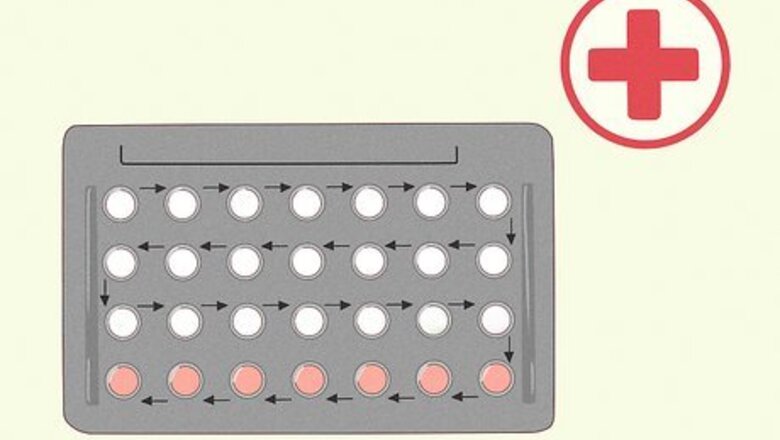
views
X
Trustworthy Source
Mayo Clinic
Educational website from one of the world's leading hospitals
Go to source
Here, we've gathered some methods you can try that have been scientifically proven effective to shorten the duration of your period and lighten your flow.
Take hormonal birth control pills
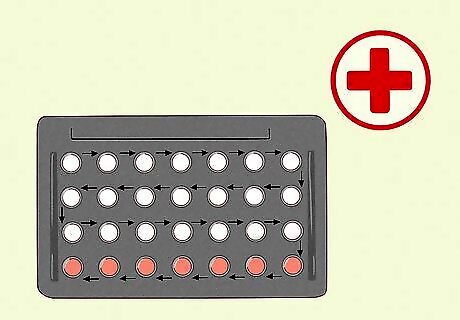
Talk to your doctor to go on hormonal birth control pills. Contrary to popular belief, you don't have to be sexually active to take birth control pills. Many people take them to have shorter, less painful periods. After an exam, your doctor will recommend the best birth control pill for you based on your health and the reasons you want to take them. With some types of pills, you can even make your period go away completely. Many pills come in a cycle with 21 days of active hormone pills and 7 days of inactive hormone pills. However, you can get regimens that are all active pills if you don't want a period at all. If you're a teenager and you're worried about your parents not allowing you to take birth control, check the laws where you live (or ask a trusted adult). Many places allow you to get birth control without involving your parents, including most states in the US.
Drink herbal tea to lighten your flow

Raspberry leaf, ginger, and yarrow tea can shorten your period. For best results, drink a couple of cups of hot tea every day, starting a few days before your period starts. These teas help ease cramping and other symptoms associated with PMS as well as improving blood circulation. Scientific studies haven't proven definitively that these teas will shorten your period, but if you like the taste, they're worth trying. One study also showed that chamomile reduces menstrual bleeding, which would lighten your flow and could potentially shorten your period.
Use acupressure for immediate pain relief
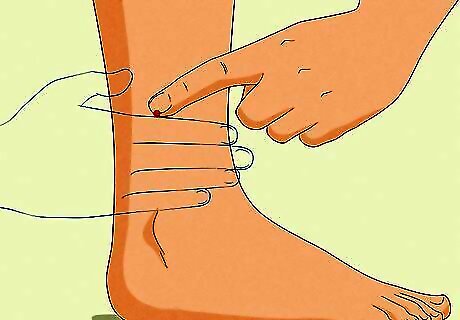
Pressing a point on your calf can alleviate period pain right away. To locate the point to press, start at the bony part of your inside ankle bone. Place four fingers horizontally above the ankle bone (about 3 inches (7.6 cm) above your ankle bone). At that point on your calf, find the tender spot behind the ankle bone. Press firmly and steadily with one finger until you feel the pain go away. This method of Sanyinjiao (SP6) acupressure has been clinically proven to reduce menstrual cramping pain. Try this method twice a day for days 1-3 of your cycle, or whenever you experience cramps.
Apply heat to soothe pain
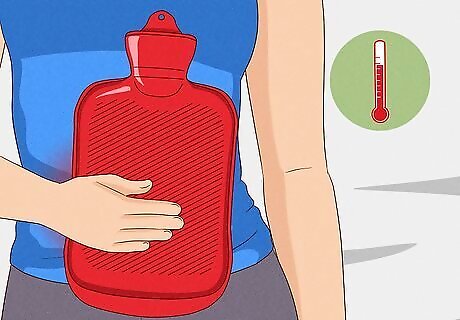
Rest a heat pad or hot water bottle on your stomach to relieve cramps. Heat works in two main ways. First, it can reduce the tension in your abdominal muscles, which can relieve painful muscle spasms. It also helps improve blood flow, eliminating swelling (and pain) from nerve compression. To get the full benefits of heat, use a heating pad or hot water bottle at 40–45 °C (104–113 °F).
Speed up your period with an orgasm

Having an orgasm may help you release period blood faster. This hasn't been studied a lot, but having an orgasm causes your uterus to contract. If you have an orgasm while you're on your period, those contractions help push out the period blood and tissue. If you're squeamish about making a mess, consider having sex or masturbating in the shower. Keep in mind that, contrary to popular belief, you can still get pregnant during your period (although the chance is very low compared to other times during your cycle). If you're having penis-in-vagina intercourse, use a condom if you're not also on birth control.
Use myrtle fruit syrup to shorten your period
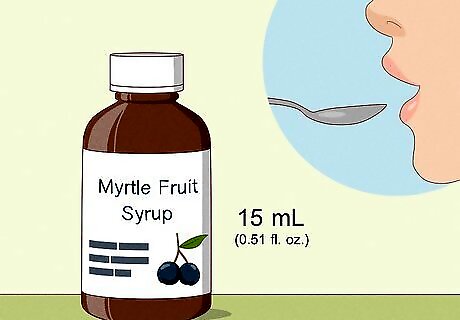
Buy myrtle fruit syrup online or at health food stores. This syrup is used as an old Iranian folk remedy to shorten periods, and scientific studies show it's effective. To take advantage of this remedy, take 15 millilitres (0.51 fl oz) of the syrup 3 times a day for 7 days starting on the first day of your period. In the study, following this regimen resulted in a period that was at least 2 days shorter. Despite the fact that this remedy has been used for hundreds of years, there haven't been any studies regarding side effects or its safety for long-term use. Be cautious and monitor carefully for side effects while using it.
Switch to a menstrual cup
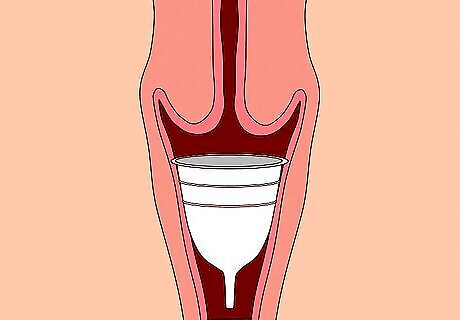
Some people claim that using a cup has made their period shorter. You can buy menstrual cups online or wherever menstruation products are sold. You simply insert the folded cup into your vagina, where it pops open to collect the menstrual blood. Read the instructions that come with the cup you buy to figure out how long you can leave it in. Take it out over a toilet to minimize the mess. There's not a lot of science to back this up, but if you're comfortable using a menstrual cup, it's worth a try! If you're concerned about dripping, you can always wear a panty liner or check out "period panties"—they absorb any blood without leaking onto your clothes for an easy solution.
Take ibuprofen to reduce a heavy flow
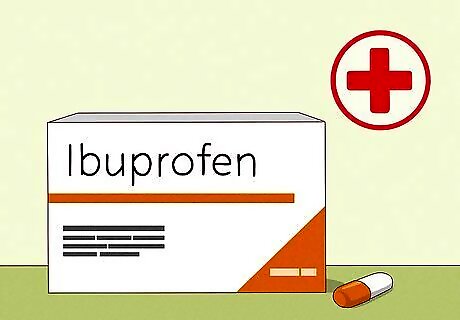
Ibuprofen eases cramps and can lower the amount of blood lost. Start taking ibuprofen at the dosage listed on the package the first day of your period and continue for the next couple of days. Don't take a larger dose than that listed on the package unless you talk to your doctor first and they tell you to do so. Common side effects include stomach problems, nausea, vomiting, headaches, and drowsiness. If you experience these side effects, you might want to stop taking ibuprofen. That being said, the drug is generally safe to use every time you get your period. Avoid drugs with acetylsalicylic acid (such as Aspirin), which have an anti-clotting effect and can actually increase the amount of blood you lose during menstruation.
Stick to a consistent exercise routine
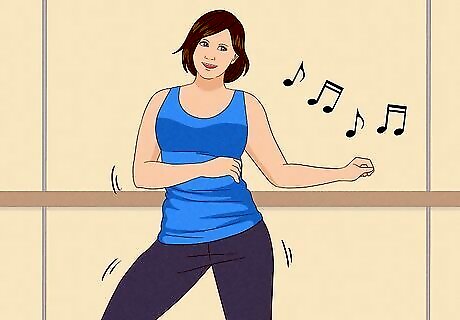
Exercise for 20-30 minutes a day improves your overall health. Studies have shown that moderate-intensity exercise can reduce painful cramps before and during your period. It might also lighten your flow or shorten your period. Just be careful that it doesn't disappear completely, as sometimes happens with athletes training intensely. A regular period is actually a sign of good health—if it stops completely, your body may not be getting the nutrition it needs. Choose an activity that you enjoy so exercising feels less like a chore. Set a goal to exercise so that you feel your best, rather than focusing on how you look. The length of your period depends more on your overall health than your weight.
Stay hydrated to shorten your period
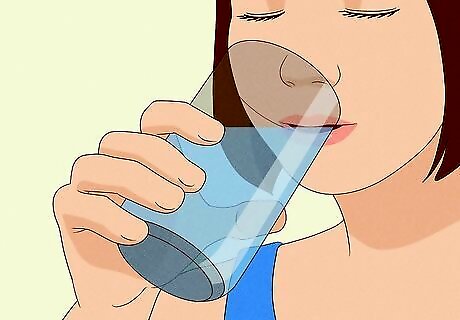
Drink 1,600–2,000 millilitres (54–68 fl oz) a day. Getting enough water can act as a natural painkiller for your body. In addition to reducing the intensity of your cramps, drinking plenty of water might also shorten your period.
Reduce your sugar intake to alleviate PMS
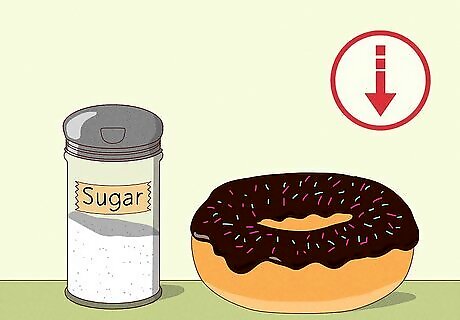
Sugar causes inflammation and can worsen PMS. If you’re prone to fatigue and irritability on your period, the insulin spikes from sugar (followed by a sugar crash) can make those symptoms even worse. Avoid a high sugar diet, which can change the ratios of estrogen and progesterone in your body. Those changes in turn can cause mood swings and even insomnia. Especially avoid sugar at breakfast. Consuming sugar early on starts your body on a blood sugar rollercoaster. Eat high-fiber foods like fruits, vegetables, whole grains, and legumes to keep you full and beat cravings.
Get plenty of sleep to prevent mood swings
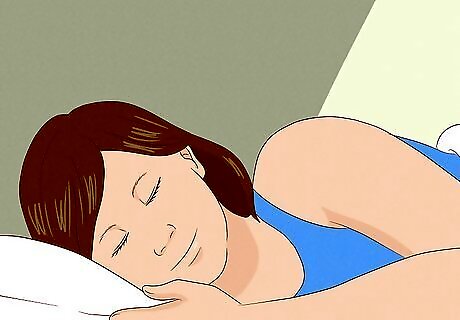
It’s common to experience insomnia both during and before your period. The fast hormonal shifts before your period can make it harder to sleep because your brain moves through the stages of sleep abnormally. Fortunately, a few changes to your routine can help you get great sleep on your period. Cut out afternoon caffeine, shut off your devices an hour before bedtime, and practice relaxation techniques like deep breathing or meditation. Before your period: Keep up your exercise routine, limit your daytime naps, and jot down stressful thoughts and set them aside before bed. During your period: Use an absorbent pad designed for nighttime use or a mattress protector to eliminate worrying about toxic shock syndrome or bleeding onto your sheets.
Try an IUD to thin the uterine lining
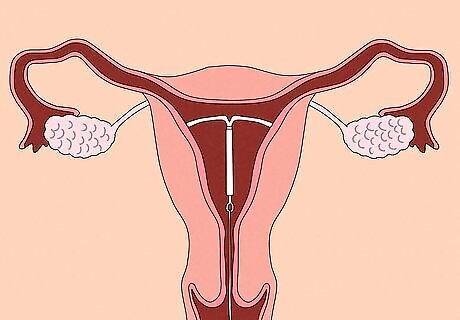
An IUD with progestin effectively reduces bleeding during your period. This device is implanted in your uterus by your doctor. An IUD can last up to 5 years and during that time, you'll progressively bleed less. If you've always had a relatively light period, you might find that you no longer have a period once you get an IUD. Common side effects of an IUD include acne, spotting, mood swings, and breast tenderness. They also sometimes cause the growth of benign cysts in your ovaries, but these aren't harmful and will usually go away on their own within a year. Talk to your doctor if you're interested in an IUD. Serious side effects or complications are really rare, but you might not be able to get an IUD if you have a sexually transmitted disease, pelvic infection, cervical cancer, or uterine cancer.
Get progestin to lighten your period
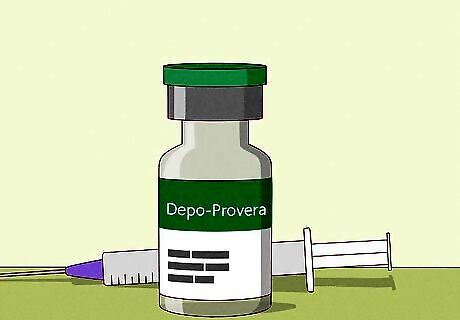
Depo-Provera is a contraceptive injection you can get every 3 months. It contains the hormone progestin in order to keep your ovaries from releasing an egg. It tends to reduce menstrual cramping and bleeding, and might full stop periods in some people. Depo-Provera isn’t for everyone. It might reduce your bone-mineral density and is not recommended for people with breast cancer, a history of depression, osteoporosis, and more.
Try a contraceptive implant to stop your period
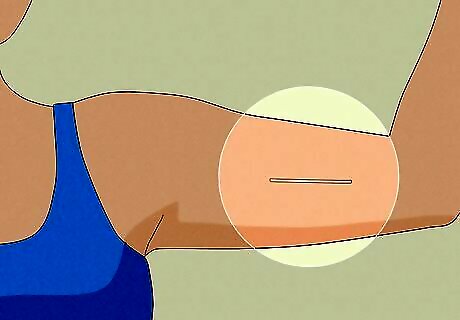
Contraceptive implants go under the skin of your upper arm. These small plastic rods inserted by your doctor release the hormone progestogen and prevent pregnancy for 3 years. Some people with a contraceptive implant might experience irregular periods and spotting, while others will have their periods stop altogether. Inserting a contraceptive implant only takes a few minutes, and it feels like getting an injection. A doctor or nurse can remove the implant anytime.












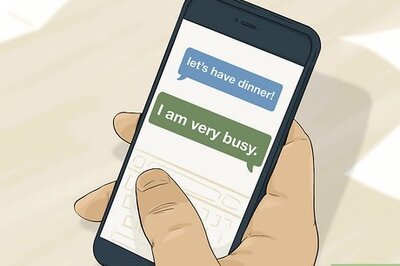






Comments
0 comment